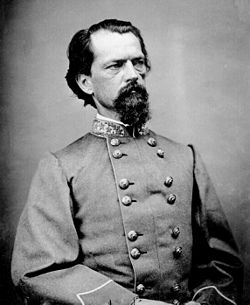| |||||||||||||||||
| |||||||||||||||||
 Results by County: Bullock: 50–60% 60–70% 70–80% 80–90% >90% Gordon: 50–60% 60–70% 70–80% 80–90% >90% No vote | |||||||||||||||||
| |||||||||||||||||
| Elections in Georgia |
|---|
 |
The 1868 Georgia gubernatorial election was held on April 20, 1868, in order to elect the Governor of Georgia. Republican nominee and former Lieutenant colonel of the Confederate States Army Rufus Bullock defeated Democratic nominee and former Major general of the Confederate States Army John B. Gordon. [1]

